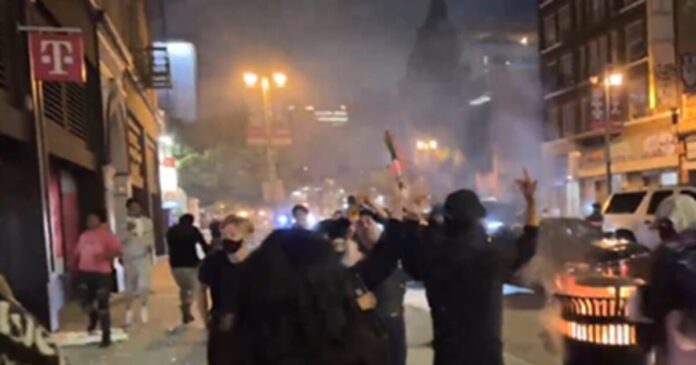Essential Facts
- A man’s body was discovered on a Los Angeles sidewalk following a night of violent anti-ICE riots, widespread looting, and a surge of law enforcement response.
- The LAPD has not confirmed any direct connection between the man’s death and the riots, as the cause of death remains under investigation.
- Ongoing unrest has resulted in over 150 arrests, multiple injuries to officers, and the deployment of thousands of National Guard troops and Marines to restore order.
By Samuel Lopez – USA Herald
LOS ANGELES, CA – The city of Los Angeles woke up to shock and uncertainty on Tuesday after police discovered a dead body on a downtown sidewalk near the site of chaotic anti-ICE riots and a brazen looting incident. The incident adds another layer of urgency and concern to a city already roiled by five consecutive nights of violent protest, property destruction, and mounting tension between demonstrators and law enforcement.
At approximately 1:30 a.m. Tuesday, Los Angeles Police Department (LAPD) officers responded to reports of an unresponsive man on the corner of West 3rd Street and Broadway—steps away from a T-Mobile store that had just been ransacked by looters. Video footage circulating on social media shows the chaotic scene.
Police have not publicly identified the man or released a cause of death, and LAPD officials have stated that, as of now, no direct connection between the death and the riots has been established. “The incident is under active investigation,”a department spokesperson said, urging the public to avoid speculation as detectives work to uncover more details.
This latest tragedy comes against the backdrop of five straight days of unrest triggered by U.S. Immigration and Customs Enforcement (ICE) raids that began on June 6. Protesters, many galvanized by opposition to ICE policies and recent enforcement sweeps, clashed violently with police across several downtown blocks. What began as peaceful demonstrations quickly devolved into property damage, street fires, and large-scale looting, leaving local businesses in shambles.
According to LAPD and California Highway Patrol (CHP) reports, at least five LAPD officers and six CHP officers have sustained injuries since the unrest began. More than 150 people have been arrested in connection with riot-related offenses, and federal immigration officials confirm that ICE has detained at least 118 individuals as operations and demonstrations continue.
As violence and property damage escalated over the weekend, President Donald Trump ordered a dramatic increase in federal and military presence in the city. On June 7th – 2,000 National Guard troops were deployed to the region—a force that quickly swelled by an additional 2,000, plus 700 Marines, as chaos persisted.
“The safety of all Angelenos is our top priority,” an LAPD spokesperson said in a statement late Monday. “We are coordinating with federal and state partners to restore peace while ensuring the right to lawful protest is protected.”
The heavy law enforcement response and ongoing civil unrest have placed an immense burden on local residents, businesses, and advocacy groups. Many downtown business owners now face the prospect of shuttered storefronts, shattered glass, and the daunting cost of rebuilding.
“The past week has been terrifying,” said Maria Delgado, a nearby shop owner. “We support peaceful protest, but this violence is hurting all of us.”
The scenes playing out in Los Angeles have sparked nationwide debate about the role of federal immigration enforcement, the limits of protest, and the appropriate use of force in restoring public order. President Trump’s decision to deploy military personnel to an American city—a rare move—has fueled heated responses from both supporters and critics.
Some civil liberties advocates warn that escalating the police and military presence risks further inflaming tensions and undermining constitutional rights. Others argue that swift action is necessary to prevent further violence and protect residents.



